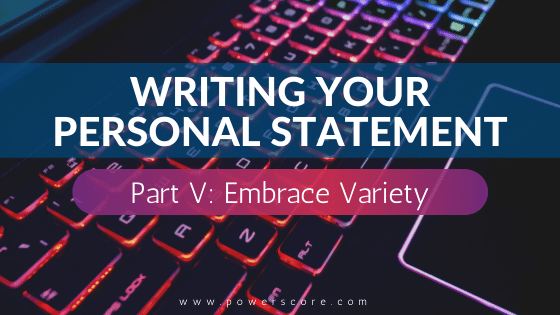Although all components of a law school application are important, the most important one is the personal statement. To that end, this series explains some of the pivotal points you should keep in mind as you prepare to write your law school application personal statement. This is a 10-part series that will help get you from starting to finishing your personal statement.
Embrace Variety
Variety is the spice of life. As it turns out, it’s also the spice of personal statements. Variety in how you write and approach your personal statement is just as important as the topic you write about. In this next piece of the “Writing Your Personal Statement” series, we’re going into the six key ways in which variety should make its way into your personal statement.
Vocabulary
Many editors warn against using “10-cent” or “fancy” words where a simpler term would do. To a degree, this is pretty good advice. Don’t over-complicate your prose simply for the sake of trying to s how off or “sound smart.” Howegver, there are situations where using higher-level vocabulary is appropriate. Advanced vocabulary can elevate your writing, and when used correctly, it will appear seamless and unstilted. It can also help you reduce word count while maintaining meaning. For example, using “juxtaposed” instead of “when placed next to or “when compared to.”
In short, don’t keep it simple because you’re afraid to use big words. Instead, write as you normally would! Intersperse vocabulary from all levels. Remember, you’re applying to law school, which is a highly academic endeavor. Using highly academic vocabulary is okay when used correctly and appropriately.
Want to beef up your vocab? Check out our free GRE Vocab List. Sure, it’s for the GRE, but there are a ton of great high-level words you likely haven’t seen or used in a while!
Transitional Phrases
Transitional phrases such as “furthermore,” “however,” “for example,” and “nevertheless” provide continuity to your writing and let your prose flow smoothly from one idea to the next. They help keep your reader informed of how your essay is progressing and alert them to changes in narrative. Don’t rely too heavily on one or two transitional words or phrases, though. Instead, mix them up! Using the same one over and over again can actually make your writing sound redundant and stale.
The Writing Center at the University of Wisconsin (Madison) has a great list of transitional phrases! Check them out and use them in your essay.
Sentence Length
Sentences can be as short as one word and as long as 30. Don’t be afraid to vary the length of the sentences you use in your personal statement! A very short sentence can serve extremely well to drive a point home, while a correctly-punctuated longer sentence can bring flow to your writing and assist you with lengthy descriptions. Relying too much on a single sentence length can make your writing sound choppy (if all sentences are short) or too convoluted (if they are all long). Instead, aim for a happy medium where short, medium-length, and long sentences are all combined into a harmonious whole.
Wondering how to fix your writing if you have too much of a particular sentence length? If you find that you have too many short sentences, consider combining some by using conjuctions such as “and,” “but,” “or,” and “yet.” If you have too many long sentences, break them up with punctuation! Periods, semi-colons, and dashes work like a charm. Shout out again to the Writing Center at the University of Wisconsin (Madison) for the list.
Topic
We’ve talked about this before, but let’s talk about it again. You don’t need to write about why you want to go to law school. In fact, the law, law school, or your lawyerly goals don’t even need to be present in your personal statement. Focus instead on talking about something you’re passionate about, something you can infuse feeling into. If it happens to be why you want to go to law school, then great! But if it’s about your passion for deep sea diving, then that’s fine, too!
The goal here is to give the admissions member reading your essay a glimpse into the person you are; don’t put a limit on what that might entail. Focus on talking about things you love, and not things you think an admissions staffer would love to read about.
Approach
You’ll hear a lot of editors tell you that you need to keep your writing in the personal statement as direct as possible. That’s certainly true, to a degree. Clear, direct writing goes a long way to making your essay readable and intellectually palatable. However, the way you choose you to tell your story can be clear and direct without being dry. Figure out how you want to tell your story and not just what you want to tell. Do you want to relate it in the form of a memory? A flashback? With multiple anecdotes? With dialogue? Will you use humor (use this sparingly and wisely)? Are you going to talk about an academic subject, or a more personal topic? All of these things will affect how you will approach your topic, and they deserve as much consideration as the topic itself.
Composition
The composition of your essay goes hand-in-hand with the approach you’ll take. Will you use dialogue? Will you focus on descriptions? Are you a fan of italics? Make sure that the way your physical story looks on paper is as pleasing as the story you’re telling, and that you keep the reader engaged by varying the ways in which it is put together.
Read More in This Series
- Take Your Time
- Plan It Out
- Get Personal
- Get Specific
- Embrace Variety (You Are Here)
- Step Away
- Edit
- Involve Others
- Proof
- Don’t Be Afraid
Subscribe to the blog to get notifications when we post new content!


Leave a Reply